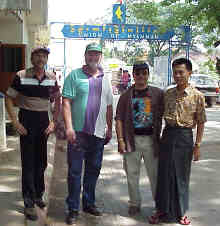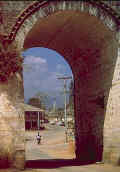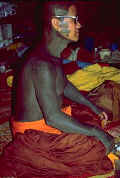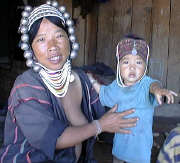Where’s that? Click here to find out
Crossing the border is a new experience. The procedure changes from time to
time, so always stop by and ask the Kobra (me), for the latest info on
getting across.
![]()
![]()


Just to get across from Maesai to Tachilek of the Shan
state (Maesai’s twin town), there are two ways to do it.
Office (1.5kms before the bridge), location of their new computer, to be processed out. Once stamped out, you may head for the borderline, cross over directly, or stop by the Kobra for a drink before going over. Most do
the latter, because they can! You are officially stamped out of the country, and are in limbo till you cross over.
molested in any way. It is just there to make sure you return! One copy will be kept by Burmese Immigration on your exit, and the other by Thai Immigration.
The first choice will, of course, get you another 30 day visa. The second, nothing! So, if you need more time in Thailand, do it right!
Let’s say you are now on the Burmese side. Entry for the day is US$5 or 250 baht for those of you who do not have US dollars. Hours to cross for the day are from 0830 – 1800 hrs. Before you enter, you must decide whether to pay the US$5 for a day, or US$18 for a visa allowing up to 2 weeks. You must decide at the time of entry
what you are going to do because, once you pay the $5, that will not be
credited towards an $18 visa. So, decide before you go.
These visas are visas on entry. If you happen to buy
a visa at any Burmese embassy, you can use it, or save it for a different
entry point, or if you are going just into the Shan area allowed through this
point. The places you are allowed to travel to are, Keng Tung, Mong La, and the new
destination of Mong Yong. I have yet to go to Mong Yong, but will on my next
trip in.
Travel to other destinations like, Rangoon, Mandalay, Pagan,
Taungghi, etc., are possible, but you must have prearranged this with the
Myanmar Travel & Tours main office in Rangoon. The border guard must have
received this notice prior to allowing you to travel to the south. Crossing
the border into China? Forget that also, until I can tell you to go! I had
my passport and Chinese visa, and the Chinese border guard said “In your
dreams babe!”. We even had a mobile phone, called the Chinese Consulate in
Chiang Mai, out of the Chinese Immigration office at Daluo, Yunnan, opposite
Mong La, had Chinese speak to Chinese! The answer, a snowball’s chance in
Hell! So there, now you heard it!
Next is the paperwork shuffle, a dance created by the Entry Gods, who must
have all specifics, prior to shaving your head (skinning the dough off of
you)! If you have journalist as a profession anywhere on your passport,
don’t bother to try. Use student as your profession, even if you’re 60, at
least you will get in! Tell them you are a slow learner, but gifted in
other ways! And, NO you can’t go on public transport to the interior. That
is only for Burmese and the peoples of Burma, Shan, Wa, Akha, …
If one drives in a vehicle, and you own it, then you can drive across the
bridge to Burma. So, you can rely on the Trek of the Kobra transport.
We go in all weather conditions; rain, floods, collapsed bridges,
snow, ice and droughts. If you have to get there otherwise, there is always
Burmese private cars to hire, but only those that are licensed to take
tourists to the destinations above. Some guys are probably not bad drivers!
The vehicles, well, a lot to be said for most and you may make it without a
breakdown! In the dry season, very dusty conditions, extreme, well you will
certainly eat a lot of dust! Most don’t like to use their A/C to save on
gas, or because it just plain doesn’t work! But, you will get there
eventually.
Those few that decide to undertake this adventure, will find
this part of the country facinating and breathtaking!
It may take one a couple of hours to process entering the country, but after
it is over it only takes a few minutes to leave.
First place after Tachilek is a place called Tar Lay. A frontier town on
the banks of the Tar Lay river, so the locals call it, that can be one’s
first coffee or coke break. There is a major bridge to cross this wide
river. Here one will find several restaurants and small vendor stalls to
buy your basic needs. Tar Lay is ever changing, as building
materials from Thailand reach here to change this rustic town to a modern
town in the middle of nowhere.
Getting back on this road from hell, but to
paradise, make a left at the end of the street – making a right will take you
nowhere and straight ahead you will run into a building! Once left, the
road winds as the river does and follows it almost all the way to
Keng Tung. In the wet season, expect road conditions worsening, deep mud
holes, mud slides, and stuck vehicles. Be patient if the road is blocked.
Eventually one gets through. Give a hand where necessary.
Half way to Keng Tung, you will find yourself in a place called Mong Phyak.
Surrounded by mountains and Burmese Army camps, this is usually a lunch stop
or a rest stop for most travelers both directions. Whether the locals are
shaking the dust out of their ears or looking like they just went for a swim
in the back of their trucks, the locals traveling are at least half relieved
that half the journey is over. Here also, is the point for the new
destination of Mong Yong. Having cleared the immigration check point, the
police checkpoint, and the intelligence checkpoint, you are now free to
travel to the next checkpoint (CP)! Sometimes new roadblocks are set up to
check travelers, foreign and otherwise.
Before Keng Tung, there is another popular reststop at Pan Kwai village.
Stop at the first Chinese restaurant on the left, run by 3 lovely sisters,
one of which went to finish her education to become an English teacher. I
passed on to her on one of my visits, that if she were to teach English in
Burma, she would not make much money! She carefully thought this over, and
being Chinese and level headed, she finished her studies and came back to
help her sisters. They now have the nicest, biggest house behind the shack
of a restaurant! I almost married her years back, but a headhunter beat her
to the post. It is always a welcome stop. They still welcome me with all
my guests and give us the best service. They serve, of course, Chinese
food, and for snacks, grab a bag of Hornet larvae, fried froggies (the whole
thing, not even gutted, refer to picture being forwarded), and even pickled
quail eggs.
Keng Tung itself is a hidden treasure for those that make it there, with
old British colonial buildings, villas and homes throughout the area. Stay
at Noi Yee Motel, which was formerly a colonial home for an officer in the
past. With rooms from US$5 to $15 for a double. Comfortable, hot water
available and plenty of space. The only thing that is missing is the tennis
court in the courtyard. Walking distance to Keng Tung lake, and the morning
market, the most popular place for all, including the locals.
It a magnificent market, colorful, filled with the hustle and bustle of city
people, village people, and tribespeople that come to buy, sell or trade.
It is an experience not to miss and most tourists will go several times
to hit a different corner they may have missed. One can find antiques, new
and old, traditional herbal medicine along with the ingredients, textiles of
Burma, China & Thailand also.


Breakfast is a great start there, with Roty,
Chinese noodles, Shan soups, Burmese dishes and other dishes I can not even
begin to name or describe. Foods for the adventurous types and for the cast
iron stomachs! Burmese or Nescafe coffee available at most places.
Definitely lots of teashops around for those with nothing to do – locals that
is! Remnants of the walled city where a gate on the southeast side of
town still stands, in the direction of the main hospital.
![]()
![]()


Other things of interests, the temple with the mummified monk, totally
tattooed Maha Katai, a magical monk respected by all and a Shan Shaman that can
look into your past, your present, the future and how to handle it. He even
has love potions, love charms, and charms to keep your loved one away. This
shaman is well respected and is even visited by medical doctors seeking
advice or assistance. He can cure the sick, help the poor, change your luck
and even improve yor business. I am a firm believer as he has proven to me
numerous times the potency of his magic. I look forward to translating his
magic book of spells of which he has presented me with a hand written copy
and sketched drawings himself.
For evening entertainment, depending on the season, there could be lots to
see and do. First off, for a song or two, the Noi Yee Kareoke is on one side
of the Motel. Ask for Wendy and tell her the Kobra sent you. For dancing
till curfew, 12 midnite, there’s the Bar, the lakeside dancehall, that went
from floating to lakeside and rebuilt. Playing tunes from the old disco
days in English to current top of the pops from Thailand. There are hidden
gambling dens from time to time with traditional gambling games. Temples
may be having festivals as well.
Plenty of restaurants around but only one
that is run by a Shan family near the market place. The head of the
household’s name is Sam (local pronounciation). Directions: go to the
southern tip of the market on the main road, it is an intersection, head
east across the street and go until the street ends, keep walking and you
will run straight into it. Not much of a place, but great food. Mom speaks
perfect English, Mr. Sam, some. Order your food in the morning and set a
dinner time with Mom. Order the Kobra specials, she knows and tell her the
Kobra sent you. You will be most pleased!
Now you know the road, village stops, checkpoints, and a little of what Keng
Tung and the Eastern Shan State has to offer. There is more, but you will
just have to check it out. Make sure you have more than 3 days to spend
there! Or you will wish you had. It is an eye opening experience. Do
it!!!
General Information about the author, Kobra Jo:


My name, as most people remember, and the place as well , is Kobra Jo.
Many people ask why. Well, it all started with snakes, mainly, always in search of the King Kobra. Then it eventually developed into the “Trek Of The Kobra”, Burma-Laos-China-N. Thai…I had a pet mongoose that just loved heading out to the rice fields with me to hunt snakes. Always found some every morning. The villagers thought I was just plain crazy to see me out on the fields with this little creature bobbing up and down across the fields.
Finally, the villagers started to turn up at the house with snakes in bags and in cans, thinking I was going to feed them to my mongoose. My mongoose really didn’t like snake meat, he would just play with them for practice and then leave them alone. He preferred pork!
My present wife is of the Wa tribe out of Burma, former headhunters and cannibals. Needless to say, I try not to piss her off.
People/tourists come to me and the border for different reasons. For me, Maesai is not like the rest of Thailand or like Burma. It is a unique border town with everything to offer. When I speak of Maesai, I can include Tachilek, Burma the twin town of Maesai.
Maesai is known world wide for gems, primarily for rubies and jade from Burma.
Be careful though, because not everything that glitters is real. Synthetic stone pushers are everywhere and the King’s treasure under the glass case is guarded by a 14 year old gal that swears that red glass is a Ruby the Sultan of Brunei should be wearing!